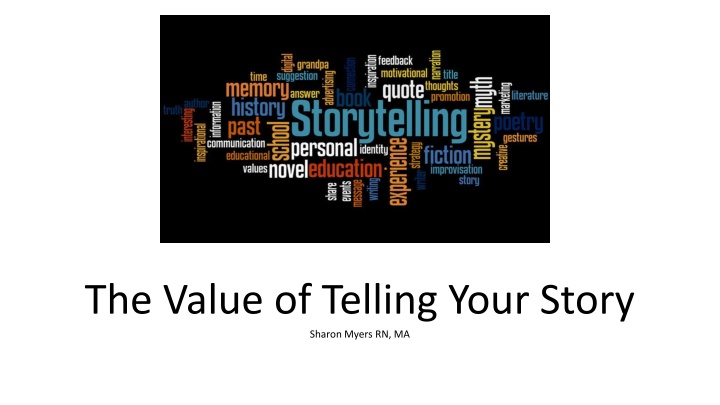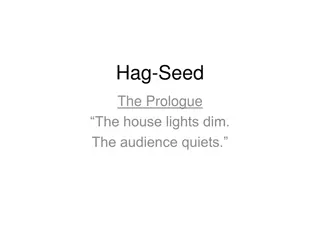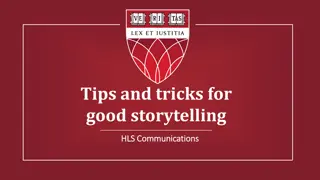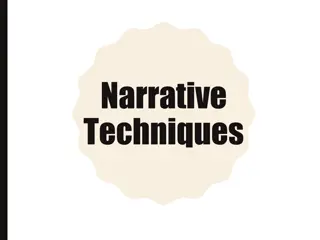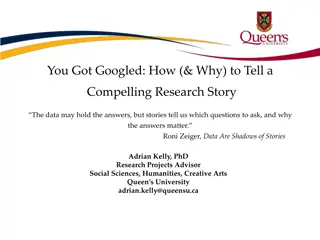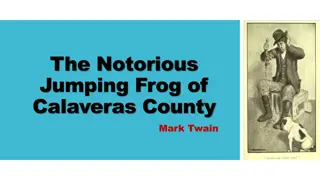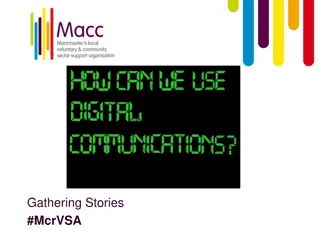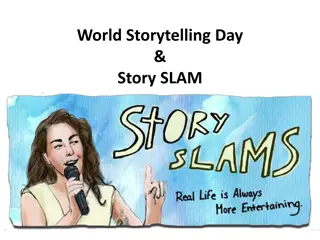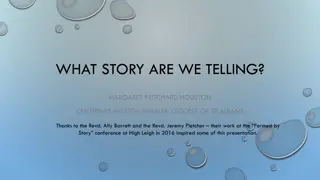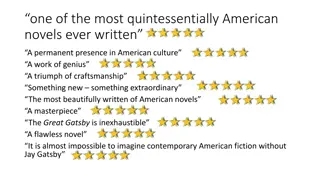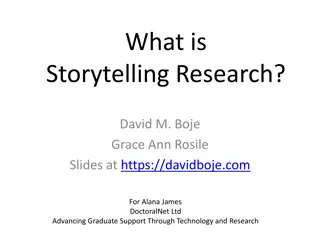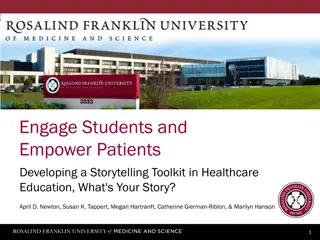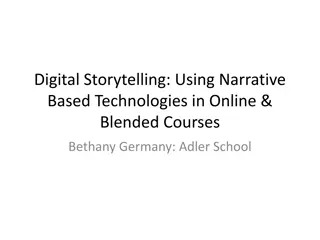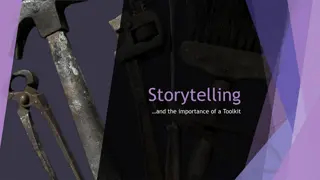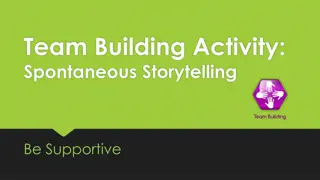The Power of Storytelling in Human Connection
Stories have been an integral part of human history, shaping our experiences, emotions, and relationships. From ancient cave drawings to modern-day narratives, storytelling serves as a means of sharing wisdom, building empathy, preserving memories, fostering connections, and finding meaning in our lives. This article explores the significance of storytelling in our personal and collective experiences, highlighting its role in enhancing human connection and understanding.
Download Presentation

Please find below an Image/Link to download the presentation.
The content on the website is provided AS IS for your information and personal use only. It may not be sold, licensed, or shared on other websites without obtaining consent from the author.If you encounter any issues during the download, it is possible that the publisher has removed the file from their server.
You are allowed to download the files provided on this website for personal or commercial use, subject to the condition that they are used lawfully. All files are the property of their respective owners.
The content on the website is provided AS IS for your information and personal use only. It may not be sold, licensed, or shared on other websites without obtaining consent from the author.
E N D
Presentation Transcript
The Value of Telling Your Story Sharon Myers RN, MA
What is a Story? The telling of a happening or connected series of happenings, whether true or fictitious; account; narration.
The History of Storytelling All cultures have told stories. Earliest evidence of stories were cave drawings in Lascaux & Chavaux, France. -The drawings date as far back as 30,000 years ago -They depict animals, humans, and other objects. Oral storytelling ( shared through oral/voice) takes many forms: poems, chants, rhymes, songs, myths, legends, fables, religion, prayers, proverbs and others
Theres Nothing But Story Stories are everywhere. Much of our lives are devoted to telling stories. The stories are in our thoughts, verbally shared and in written word or format. Telling stories is a human universal trait. It develops spontaneously without training in childhood - Brian Boyd We have been telling stories for as long as history can see, and we will likely continue to do so for the rest of our lives.
Examples of Typical Stories Doctors appointment Covid public policies Stories about family history and traditions Story of why you are listening to this lecture today *Personal stories we carry in our heads about who we are and why we do what we do
Why Do Humans Tell Stories? Survival-The passing down of wisdom. Empathy - Stories can also let us see how others think and feel. The more compelling the story, the more empathetic people become. Memory- Stories allow us to put things we experience into our memory storage. By telling a story rather than merely reciting dry facts, we remember the details more clearly. Connection to Others-Stories help us find common ground and connect with other people and our environment Control- Helps us find order and make sense of the events in a random world. Connecting the dots.
Connecting the Dots A Qualitative Study Exploring the Perceptions and Motivations of Patients with Heart Failure who Transitioned from Non-Adherence to Adherence Sharon L. Myers MA, RN Elena O. Siegel PhD, RN Dianne A. Hyson PhD, RDN Julie T. Bidwell PhD, RN Department or Presentation Title 1
Connecting the Dots Helped Patients with Heart Failure Be Adherent to Medical Advice Making Connections See relationship between their adherence behaviors and their symptoms See relationship adherence behaviors and the status of their HF See relationship between symptoms and status of their HF status Department or Presentation Title 12
Making Connections- Narrative examples Once I started getting all this water off of me, well it was cleared up. I wasn t coughing. I was thinking, I know this is all smokers cough, and it wasn t . It was fluid on my lungs In the hospital they had me on a strict diet (low sodium), and it helped me get the water off. That helped me notice what would make me feel better He was looking at the comparison of my heart when I was really sick and then my heart after I was on my medication. He said it appeared my heart had gone back to normal size. It locked it in to where I don t even think about having a pickle
Stories Have a Major Influence on Why We Do What We Do The transformational power of how you talk about your life: We ve all create our own personal histories, marked by highs and lows, that we share with the world and we can shape them to live with more meaning and purpose. How you talk about the major events of your life has a profound impact on your personality. The way you tell this story, even just to yourself, helps shape who you are. How you interpret your life, and tell its story, has profound effects on what kind of person you become. If you change parts of your life story, could you become a healthier, happier person?
Our Stories We all carry around a book in our head that has main events, pivotal turning points and memories from our lives. These narratives exist whether we choose to give them much conscious attention or not. They lend meaning to our existence and provide the foundation for our sense of identity. You are your story.
You Are Your Story You Are Your Personal Narrative Dan McAdams- Researcher on Narrative Identity at Northwestern University Alongside our goals and values and character/personality traits, our personal narratives reflect a stable aspect of our personalities The way we tell our personal stories have implications for our mental health and overall wellbeing Those who tell stories with redemptive meaning (of overcoming suffering and adversity) and personal agency (ability to grow and effect change) have better mental health, overall well being and maturity
You Are Your Story You Are Your Personal Narrative Narrative Therapy- Helping people to re-interpret their personal stories in a more constructive (and true) light. NOTICING The book in your head is not the final edition. We can edit, revise and interpret the stories we tell about our lives Modify your story as you tell it, and perhaps you can change some of your negative patterns and your overall sense of self, happiness, satisfaction, peacefulness, confidence, how you interact with others, judgement etc.
How We See Ourselves, Depends On What We Are Looking At
Changing Our Story Even making small story edits to our personal narratives can have a big impact on our lives. Through the telling and discussion of your story, you may end up editing and reinterpreting your story, and come to notice another side. Telling your story out loud or in writing makes you more likely to be able to describe events from different perspectives, and see multiple explanations. Telling your story helps you to see the depth and complexity in your decisions, and life choices.
Think of An Event or Time in Your Life Which is Making You Feel Stuck or That May Be Creating an Ongoing Negative Narrative in Your Head What happened and when? Who was involved? What were you and others thinking and feeling, and why was this event especially important for you? What does this event say about who you are, how you have developed over time or who you might become? When you are finished writing your account, take a step back and look at the story as a whole and as a close friend who loves you would look at it. What major themes, feelings, or lessons does this friend see in your story? What does your friend say about the the story of the event and about the kind of person you are and might become? What might your friend say about your story as it relates to your values, passions, aspirations, patterns, reactions and any positive impact you could have on others?
Story Prompts (An activity to do with family, friends or just in a journal) Take us on a walk around the neighborhood or rural area when you lived as a child. Can you take us with you to visit a place you went only once or twice but have always wanted to go back again? Can you remember a night your parents never found out about? Can you remember a time you tried to cook something and it did not turn out? What was your most precious childhood possession? Can you remember a pet you once had that you no longer have? Can you tell us about the person for whom you are named or something else about your name?
In Conclusion Stories are everywhere They help us connect the dots and make meaning in our chaotic world Telling your stories out loud or writing about them can help us discover new ways of viewing our story line Telling stories can help us get unstuck and evolve and grow Asking yourself how a friend might view your story line and conclusions might help you see another view of yourself and your life
